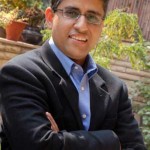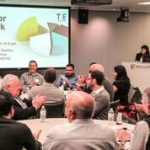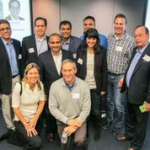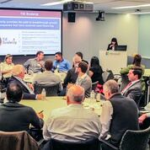

CAMBRIDGE, MA—TiE-Boston’s sold-out investors’ panel on Tuesday sent out a few loud and clear messages to entrepreneurs: market corrections will not impact investor behavior and that Boston needs more $10 billion-plus companies.
“The public market corrections will affect private market valuations. However, it will not impact investor behavior. We will still make the same number of investments,” said Anupendra Sharma, a TiE-Boston charter member, panelist and senior partner at a leading corporate venture capital firm. “Innovation takes place in waves – a lot of companies get started in a short time frame. So if you are at the cutting-edge of a hot topic, get out in front of investors early.”
TiE-Boston, the second largest TiE Chapter in the world, held its annual Investor Outlook Dinner on Tuesday at the Microsoft NERD Center in Cambridge, MA.
It was a sold-out event with representation from entrepreneurs at all stages. It was very interactive.
“Given the uncertainties in the market, entrepreneurs seemed somewhat worried,” Sharma said.
The panel was moderated by Gaurav Jain, Principal, Founder Collective. In addition to Sharma, speakers included Stan Reiss, General Partner, Matrix Partners; Jeff Bussgang, General Partner, Flybridge Capital; Nicole Stata, Founder and Managing Director, Boston Seed Capital; and David Steinberg, Co-founder and EVP, Company Creation, PureTech.
Sharma said strategic investors are here to stay and in certain segments, they have become well understood. Experienced strategic investors can be invaluable.
“Don’t go to strategic investors while you are still in the process of discovering your niche and pivoting your business models,” a panelist advised entrepreneurs.
The panelist said Boston needs more $10 billion-plus companies that stay independent. “This is an extraordinary city with no parallel. There are so many exciting areas to focus on,” he said.
How does Boston figure in global healthcare technology market?
Sharma said: “Boston leads the world in several areas. We are #2 to Silicon Valley. But we lead the world in several areas. Biotechnology and Robotics are just two that come to mind. GE’s decision to move to Boston is a validation of what we have to offer.”
Jain of the Founder Collective said that a few important insights came up during the lively discussion.
“Capital markets largely don’t affect the startup ecosystem. Great companies get started in all parts of the cycle. Companies that shouldn’t be funded won’t get funded if the capital markets go south, but that’s a good thing,” Jain said. “We need more platform companies here if we want to further accelerate the Boston tech ecosystem. Biotech has done this well.”
On the Boston-Silicon Valley dichotomy, Jain said both have their strengths and weaknesses.
“SV has some great anchor companies so the best talent gravitates there,” Jain said. “Boston is strong in Biotech (similar to SV for tech) and also good at robotics, etc.”
Tie-Boston’s annual Investor Outlook Dinner has become a tradition for TiE-Boston. Attended by industry leaders and entrepreneurs, this event brings together venture capitalists panelists representing the fields of technology, healthcare/life sciences, software and consumer products to discuss their outlook on venture investments for the year ahead.
[columns][three-columns]  [/three-columns][three-columns]
[/three-columns][three-columns]  [/three-columns][three-columns]
[/three-columns][three-columns]  [/three-columns][/columns]
[/three-columns][/columns]















